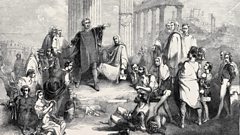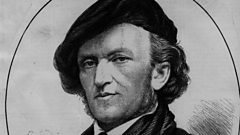
Wagner 200 - Rienzi
John Shea presents an archive recording from 1976 of Wagner's third opera Rienzi. Starring tenor John Mitchinson and sopranos Lois McDonall and Lorna Haywood.
Wagner 200. John Shea presents the final Opera on 3 of the season, a ���˿��� archive recording from 1976 of Wagner's third opera Rienzi, the Last of the Tribunes in the 1842 version with additional music orchestrated from sketches.
Rienzi is a grand opera in 5 acts owing a great deal to the examples of the genre by Meyerbeer and Halévy. The original performance material for Rienzi was destroyed during the Dresden bombings of 1945 as was the score which was apparently given to Hitler as a present and lost in the destruction of his bunker in Berlin. Consequently performances since then, which have been few and far between, have been reconstructions. In the mid 1970s Edward Downes and others worked on the most complete version ever heard which was later published in the Wagner Edition. Wagner scholar John Deathridge tells John Shea about the preparation of the material for this studio recording and there's also a Radio 3 Opera Guide about Rienzi which can be downloaded for free after the broadcast.
Rienzi is set in Rome in the middle ages and the central figure is Cola di Rienzi, who leads the populace against the power for the nobles.
Wagner based it on the novel by the English writer Henry Bulwer-Lytton published in 1835. He completed it in 1840 and it was first performed in Dresden in 1842 when despite its length it was a considerable success and led to Wagner becoming Kapellmeister at the Dresden Opera the following year. However because of its scale Wagner subsequently made cuts and throughout the 19th century it was often performed in Germany and other parts of Europe and even reached America. Wagner later disowned the work and like his two earlier operas it has never been staged at the Bayreuth Festival, the Wagner festival still run by his descendants.
Rienzi.....John Mitchinson (tenor)
Irene.....Lois McDonall (soprano)
Stefano Colonna.....Michael Langdon (bass)
Adriano.....Lorna Haywood (soprano)
Paolo Orsini.....Raimund Herincx (baritone)
Raimondo.....David Ward (bass)
Baroncelli.....Adrian De Peter (tenor)
Cecco del Vecchio.....Paul Herald (bass)
Messenger of Peace.....Elizabeth Gale (soprano)
Herald.....Brian Cookson (tenor)
���˿��� Northern Symphony Orchestra
���˿��� Northern Singers
Conducted by Edward Downes.
Last on
More episodes
Previous
Clips
-
![]()
Wagner: Rienzi - Opera Guide
Duration: 07:32
-
![]()
John Deathridge talks to John Shea about Wagner's Rienzi
Duration: 23:24
Music Played
-
![]()
Richard Wagner
Rienzi - Act 3
-
![]()
Richard Wagner
Rienzi - Act 4
-
![]()
Richard Wagner
Rienzi - Act 5
Act 1 - A street in Rome
Rienzi’s sister Irene is about to be abducted by Paolo Orsini and his followers when they are confronted by their rivals, the Colonnas. Adriano Colonna, in love with Irene, attempts to protect her in the ensuing brawl. The commanding presence of Rienzi, when he arrives on the scene, quells the fighting; his friends and the crowd all urge him to take power and bring order to the city.
��
Alone with Irene and Adriano (terzet, ‘O Schwester, sprich’), Rienzi tells how he has sworn to avenge his brother, murdered by a Colonna; the motif (sometimes called the Vengeance motif) first heard here is a forerunner of the motif of reminiscence as used in the Ring. Adriano atones for his family’s guilt by pledging himself to Rienzi; in return, he is entrusted with Irene and they sing of their love in an impassioned duet (‘Ja, eine Welt voll Leiden’).
��
A��single sustained note is sounded on a trumpet (first heard at the start of the overture, it returns periodically to symbolize Rienzi’s revolutionary authority). An excited crowd gathers and acclaims Rienzi as their liberator and saviour (‘Gegrüsst’). Refusing the title of king, he tells them that the state should be governed by a senate; he himself will be their tribune.
Act 2 - A great hall in the Capitol
An effulgent orchestral introduction heralds the Chorus of the Messengers of Peace: a triumphal song by the patrician youths, clad in white silk, celebrating the success of their peace mission throughout Italy. The Colonnas and Orsini, compelled to obey the law just as the plebeians do, conspire together against Rienzi. Rienzi receives the foreign ambassadors and claims for the Roman people the historic right to elect the German emperor.
��
A ballet, allegorizing the union of ancient and modern Rome, is performed. Orsini stabs Rienzi with a dagger, but his assassination attempt is thwarted by Rienzi’s steel breastplate. Colonna’s men have meanwhile attempted to seize the Capitol. Senators and people demand death for the traitors. Adriano and Irene plead for Colonna’s life and Rienzi pardons the nobles. In a final ensemble Rienzi’s clemency is praised by Adriano and Irene but condemned as weakness by his friends Baroncelli and Cecco; the nobles plot vengeance while the people hail their leader.
Act 3 - The large square in the ancient forum
The nobles are preparing to attack Rienzi, who, with the battle-cry ‘Santo Spirito, Cavaliere!’ rouses the people to take up arms. Adriano agonizes over his divided loyalty to his father and to the brother of Irene: ‘Gerechter Gott!’ A grand procession of senators and armed citizens is led by Rienzi, fully armed and on horseback: the battle-cry ‘Santo Spirito, Cavaliere!’ is re-echoed, and there is some heavily scored military music.
��
Adriano begs in vain to be sent as an ambassador to his father. He tells Irene that death is calling him, but finally yields to her entreaties to stay and protect her. Irene and the women pray for victory and in due course Rienzi returns in triumph; the bodies of Orsini and Colonna are borne in on litters. Adriano curses Rienzi and vows revenge. Rienzi is borne aloft on a triumphal chariot, crowned with a laurel wreath.
Act 4 - A square in front of the Lateran church
A��series of taps on the timpani open the act in an atmosphere of mystery and conspiracy as Baroncelli, Cecco and some citizens discuss the situation. They deplore Rienzi’s arrogance in interfering with the election of the German emperor: the Germans have, as a result, withdrawn their ambassador from Rome. The new emperor, moreover, is an ally of the pope, who was Colonna’s protector. Cardinal Raimondo has also turned to the pope for protection. Baroncelli alleges that Rienzi sought an alliance with the nobles, offering his sister Irene in return. The crowd demands evidence of this treachery and Adriano, throwing off his disguise, endorses the charge. The conspirators vow to strike at Rienzi during the victory celebrations later that day. As they turn to go, they see a procession of priests and monks, led, to their surprise, by Raimondo; they assume they are entering the church in preparation for the celebratory Te Deum.
��
Rienzi enters in festal garb. Adriano baulks at assassinating Rienzi in view of Irene, while the other conspirators are won over by his rhetoric. Suddenly Raimondo appears on the steps of the Lateran to proclaim the excommunication of Rienzi. As his followers desert him, Adriano tries to persuade Irene to abandon him too, but she remains, in her brother’s embrace.
Act 5.i–iii - A hall in the Capitol
Rienzi prays to God for strength: ‘Allmächt’ger Vater’; the music of his Prayer draws on the dignified, eloquent main theme of the overture. Joined by Irene, he tells her that he has been deserted by everybody; she refuses to leave him for Adriano and they fondly embrace. Rienzi leaves to arm himself and Adriano enters in agitation. As the commotion outside increases, he tries to carry away Irene by force, but she pushes him away and runs out.
Act 5.iv - A square in front of the Capitol
Deaf to Rienzi’s pleas, the people, led by Baroncelli and Cecci, try to stone him. They set fire to the Capitol and Rienzi and Irene are seen on the balcony, clasped in each other’s arms. Adriano and the nobles attack the people and try to reach Irene. But as he approaches, the building collapses, burying Adriano as well as Rienzi and Irene.
Broadcast
- Sat 6 Jul 2013 16:00���˿��� Radio 3




